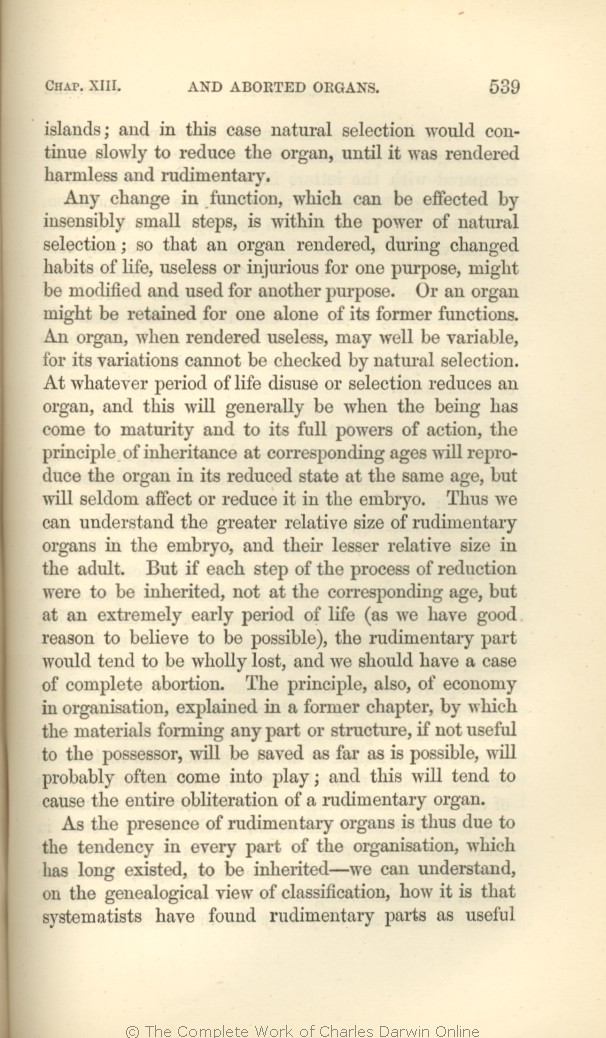islands; and in this case natural selection would continue slowly to reduce the organ, until it was rendered harmless and rudimentary. ↑| 3 blocks not present in 1859 1860 1861 1866 1869; present in 1872 | | It appears probable that disuse has been the main agent in rendering organs rudimentary.
It would at first lead by slow steps to the more and more complete reduction of a part, until at last it became rudimentary,— as in the case of the eyes of animals inhabiting dark caverns, and of the wings of birds inhabiting oceanic islands, which have seldom been forced by beasts of prey to take flight, and have ultimately lost the power of flying.
Again, an organ, useful under certain conditions, might become injurious under others, as with the wings of beetles living on small and exposed islands; and in this case natural selection will have aided in reducing the organ, until it was rendered harmless and rudimentary.
|
|
Any change in
function, | function, 1859 1860 1861 1866 |
| structure and function, 1869 1872 |
| insensibly 1859 1860 1861 1866 1869 | insensibly 1872 |
| steps, 1859 1860 1861 1866 1869 | | stages, 1872 |
| during 1859 1860 1861 1866 | | through 1869 1872 |
| ..... 1860 1861 1866 1869 1872 | | easily 1859 |
| Or an 1859 1860 1861 1866 | | An 1869 1872 |
| might 1859 1860 1861 1866 | | might, 1869 1872 |
| be 1859 1860 1861 1866 | | also, be 1869 1872 |
| An organ, 1859 1860 1861 1866 1869 |
| Organs, originally formed by the aid of natural selection, 1872 |
| when 1859 1860 1861 1866 1872 |
| originally formed by the aid of natural selection, when 1869 |
| useless, 1859 1860 1861 1866 1869 | | useless 1872 |
| its 1859 1860 1861 1866 1869 | | their 1872 |
| cannot 1859 1860 1861 1866 | | can no 1869 1872 |
| be 1859 1860 1861 1866 | | longer be 1869 1872 |
| 1 blocks not present in 1859 1860 1861 1866 1869; present in 1872 | | All this agrees well with what we see under nature.
|
| At 1859 1860 1861 1866 1869 | | Moreover, at 1872 |
| disuse 1859 1860 1861 1866 | | either disuse 1869 1872 |
| to 1859 1860 1861 1866 |
| has to exert 1869 1872 |
| reproduce 1859 1860 1861 1866 1869 |
| tend to reproduce 1872 |
| age, but 1866 |
| age, and consequently 1859 1860 1861 |
| mature age, but 1869 1872 |
| or reduce 1859 1860 1861 1866 | or reduce 1869 1872 |
| relative size of rudimentary organs in the embryo, 1859 1860 1861 1866 |
| size of rudimentary organs in the embryo relatively to its other parts, 1869 |
| size of rudimentary organs in the embryo relatively to the adjoining parts, 1872 |
| the 1859 1860 1861 1866 | | a 1869 |
| an extremely 1859 1860 1861 1866 | | a very 1869 |
| life 1859 1860 1861 1866 | | life, 1869 |
| (as we have good reason to believe 1859 1860 1861 1866 |
| the rudimentary part would tend 1869 |
| possible), the rudimentary part would tend to be 1860 1861 1866 |
| possible) the rudimentary part would tend to be 1859 |
| OMIT 1869 |
| economy 1866 |
| economy, 1859 1860 1861 |
| the economy of organisation, 1869 |
| in organisation, explained in 1866 |
| explained in 1859 1860 1861 1869 |
| part 1859 1860 1861 1866 | | part, 1869 |
| or structure, 1859 1860 1861 1866 | or structure, 1869 |
| will probably often 1859 1860 1861 1866 |
| may often have 1869 |
| play; 1859 1860 1861 1866 | | play, 1869 |
| this will tend to cause 1859 1860 1861 1866 |
| aided in 1869 |
|
As the presence of | As the presence of 1859 1860 1861 1866 1869 |
| Finally, as 1872 |
| organs 1859 1860 1861 1866 1869 | | organs, 1872 |
| is thus due to the tendency in every part of the organisation, which has long existed, to be 1859 1860 1861 1866 1869 |
| by whatever steps they may have been degraded into their present useless condition, are the record of a former state of things, and have been retained solely through the power of 1872 |
| inherited— 1859 1860 1861 1866 1869 | | inheritance,— 1872 |
| systematists 1859 1860 1861 1866 1869 | | systematists, 1872 |
| have 1859 1860 1861 1866 1869 |
| in placing organisms in their proper places in the natural system, have often 1872 |
|









